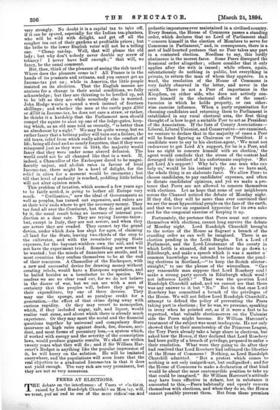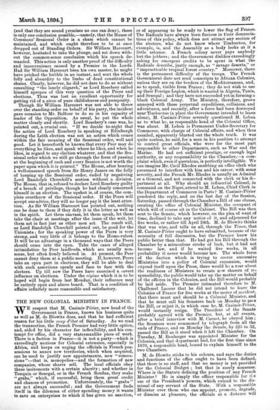PEERS AT ELECTIONS.
HE debate on t he interferenc of Peers el Pleit16,3§, T raised by Lord Randolph Churchill on Mon lay, will, we trust, put: an end to one of the most ridiculous-Ithd pedantic impostures ever maintained in a civilised country. Every Session, the House of Commons passes a standing order, which declares that no Lord of Parliament shall " concern himself in the election of Members to serve for Commons in Parliament," and, in consequence, there is a sort of half-hearted pretence that no Peer takes any part in a contested election. Needless to say, this lordly abstinence is the merest farce. Some Peers disregard the Sessional order altogether ; others consider that it only applies after the writ is issued ; while others, again, ostentatiously do nothing in public, but everything in private, to return the man of whom they approve. In a word, the resolution of the House of Commons is very feebly observed in the letter, and never in the spirit. There is not a Peer of importance in the Kingdom, on either side, who does not actively con- cern himself in the electoral affairs of the consti- tuencies in which he holds property, or can other- wise exercise influence. When a party organisation for choosing candidates and returning them to Parliament is established in any rural electoral area, the first thing thought of is how to get a suitable Peer to act as President of the Association. If the lists of County Associations— Liberal, Liberal Unionist, and Conservative—are examined, we venture to declare that in the majority of cases a Peer will be found figuring as Chairman or President. If a candidate were to say to his election-agent, We must not endeavour to get Lord A's support, for he is a Peer, and has no right to concern himself with an election,' the agent would conclude that the stress of the contest had deranged the intellect of his unfortunate employer. Not get Lord A's support ! Why he's the one man who can help us,' would be his instant reply. As we have said, the whole thing is an elaborate farce. We allow Peers to choose candidates, to pay candidates' expenses, and often to dictate candidates' opinions, and yet we make a pre- tence that Peers are not allowed to concern themselves with elections. Let us hope that none of our neighbours across the Channel noticed the debate of Monday night. If they did, they will be more than ever convinced that we are the most hypocritical people on the face of the earth, and that we love an organised hypocrisy for its own sake and for the congenial exercise of keeping it up.
Fortunately, the pretence that Peers must not concern themselves with elections, cannot long survive the debate of Monday night. Lord Randolph Churchill brought to the notice of the House as flagrant a breach of the standing order as can well be imagined. There is an election pending in the Leith Burghs. Yet a Lord c. f Parliament, and the Lord-Lieutenant of the county in which Leith is situated, did not hesitate to go down t. Edinburgh, and make a speech which it was a matter o' common knowledge was intended to influence the pend ing elections in Scotland,—" to keep the Scotch elector I straight," to use the phrase of the wirepullers. " Can. any reasonable man suppose that Lord Rosebery coul I make a strong party speech in Edinburgh which woul I not influence Leith ? " That was the question Lord Randolph Churchill asked, and we cannot see that there was any answer to it but "No." But in that case Lord' Rosebery has committed a breach of the privileges of the House. We will not follow Lord Randolph Churchill's attempt to defend the policy of preventing the Peers taking part in elections ; for he was, we presume, speaking in irony when he pointed out, as if it were a fact to be regretted, what valuable electioneerers on the Unionist side the Peers might become. Sir William Harcourt's treatment of the subject was most inadequate. He not only showed that by their membership of the Primrose League, the Tory Peers already take a large share in elections, but asked how the House, if they declared that Lord Rosebery had been guilty of a breach of privilege, proposed to enfor e their resolution. What were they going to do after they had resolved that Lord Rosebery had infringed the liberties of the House of Commons ? Nothing, as Lord Randolph Churchill admitted. " But a protest which comes to nothing is not only insignifieant, but undignified ; and for the House of Commons to make a declaration of that kind would be about the most contemptible position to take up that could be imagined." Sir William Harcourt's attitude may have been effective in debate, but in substance it amounted to this,—Peers habitually and openly concern themselves with elections, and when they do so, the House cannot possibly prevent them. But from these premises (and that they are sound premises no one can deny), there is only one conclusion possible,—namely, that the House of Commons' Sessional Order is a sham which cannot be maintained, and which ought therefore to be at once dropped out of Standing Orders. Sir William Harcourt, however, hesitated to take the plunge, and sat down with- out the common-sense conclusion which his speech de- manded. This action is only another proof of the difficulty and inconvenience caused by a Premier in the Lords Had Sir William Harcourt been his own master, he might have pricked the bubble in an instant, and sent the whole folly and absurdity to the limbo of dead constitutional shams. Clearly, however, he did not dare to do so without consulting "the lonely oligarch," as Lord Rosebery called himself apropos of this very question of the Peers and elections. Thus was lost an excellent opportunity for getting rid of a piece of pure childishness and pomposity. Though Sir William Harcourt was not able to throw over the standing order on behalf of his party, the incident gave occasion to Mr. Balfour to do so in his capacity of leader of the Opposition. As usual, he put the whole matter clearly and shortly. Lord Rosebery's case was, he pointed out, a crucial one. " If we decide to-night that the action of Lord Rosebery in speaking at Edinburgh during the Leith election was not an action which comes within the fair meaning of the Sessional order, well and good. Let it henceforth be known that every Peer may do everything he likes, and speak where he likes, and when he likes, in regard to any election whatever, and that the Ses- sional order which we still go through the form of passing at the beginning of each and every Session is not worth the paper upon which it is printed." The House, after hearing a well-reasoned speech from Sir Henry James on the folly of keeping up the Sessional order, ended by negativing Lord Randolph Churchill's motion without a division. The House, that is, refused to declare Lord Rosebery guilty of a breach of privilege, though he had clearly concerned himself in an election. The upshot is, of course, the com- plete overthrow of the Sessional order. If the Peers will accept our advice, they will no longer pay it the least atten- tion. As Sir William Harcourt has pointed out, nothing can be done to them if they defy it in the letter as well as in the spirit. Let them canvass, let them speak, let them take the chair at meetings after the issue of the writ, let them aet in fact just as other men act. The result will, as Lord Randolph Churchill pointed out, be good for the Unionists ; for the speaking power of the Peers is very strong, and very little of it belongs to the Home-rulers. It will be an advantage in a thousand ways that the Peers should come into the open. Take the cases of alleged intimidation by Peer landlords, which are usually non- sense, but often firmly believed in. At present, the Peer cannot deny them at a public meeting. If, however, Peers take an open part in elections, they will be able to deal with such assertions openly and face to face with the electors. -Up till now the Peers have exercised a covert influence on elections. Under the regime which it is to be hoped will begin from last Monday, their influence may be entirely open and above board. That is a condition of affairs infinitely more reasonable and satisfactory.



































 Previous page
Previous page